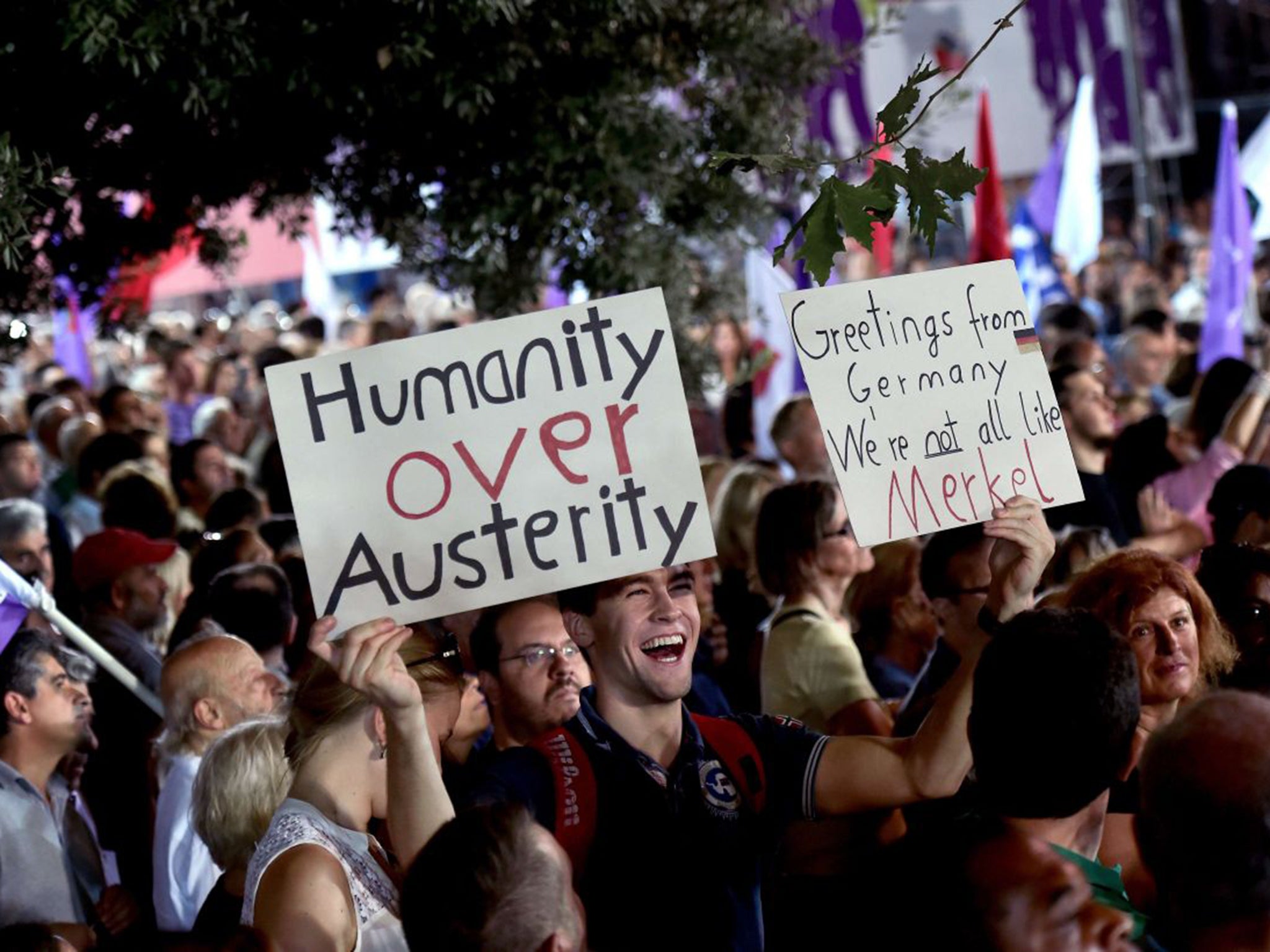Greece elections: Whoever wins will gain the poisoned chalice of having to implement the agreed bailout terms
'The next four years are going to be brutally hard, as people pay more tax'

Your support helps us to tell the story
From reproductive rights to climate change to Big Tech, The Independent is on the ground when the story is developing. Whether it's investigating the financials of Elon Musk's pro-Trump PAC or producing our latest documentary, 'The A Word', which shines a light on the American women fighting for reproductive rights, we know how important it is to parse out the facts from the messaging.
At such a critical moment in US history, we need reporters on the ground. Your donation allows us to keep sending journalists to speak to both sides of the story.
The Independent is trusted by Americans across the entire political spectrum. And unlike many other quality news outlets, we choose not to lock Americans out of our reporting and analysis with paywalls. We believe quality journalism should be available to everyone, paid for by those who can afford it.
Your support makes all the difference.Greeks are going to the polls, grimly aware that, whoever wins, things can only seemingly get worse.
Both parties at the top of the polls, Syriza on the left and New Democracy on the right, have agreed to the draconian terms of the third EU-backed bailout agreed by Syriza’s leader, Alexis Tsipras. All that remains is to implement them.
That is why the biggest unknown in this, Greece’s third national vote in a year, is how many voters are going to abstain, or vote for parties committed to leaving the eurozone.
“The next four years are going to be brutally hard,” said 30-year-old artist “Cacao Rocks”. “Until now we have only had capital controls,” he said. “Now people will have to pay more tax, there will be many cuts; whoever wins, the people are bound to be disappointed.”

With other young artists, he backed Mr Tsipras’s successful “No” campaign during the referendum on the bailout by covering city buildings with spectacular political graffiti. So he was bitterly disappointed when the Prime Minister eventually agreed the bailout terms. “It was a betrayal,” he says simply, now throwing his support behind the anti-euro campaign of Popular Unity, a Syriza breakaway.
The final opinion polls have pointed to Syriza gaining a slim lead over its New Democracy rivals. At the crowning rally of the campaign on Friday night, the hard left party put on a strong show, filling Syntagma Square in central Athens. with 10,000 flag-waving supporters.
But disappointment was in the air. “He made some mistakes while he was in power, but he fought bravely,” said Spyros Rousshais, a 25-year-old lawyer, as Mr Tsipras spoke. “How you judge him depends on whether you go by effort or results. I go by effort because I believe only he can fight cronyism and corruption. If we don’t fight these problems, we will never recover from them.”
“We were all disappointed [when he signed the bailout deal],” said a woman who gave her name only as Bezou. “but at this moment there is no other hope for us.”
“When we elected him in January, we expected much from him,” she went on. “Now, it’s different. I am here because I don’t want the movement to disappear again – we don’t want the old parties to come back.”
But one of those old parties, New Democracy, which for decades alternated in power with Pasok, the socialists, is snapping at Syriza’s heels. At his final rally on Thursday, its leader, Vangelis Meimarakis, condemned Syriza’s “false promises”.
“The Syriza experiment ends on Sunday,” he told supporters.
Whether or not that’s the case, neither Mr Tsipras nor any other leader is promising good times for Greece – which helps explain why Greek elections are coming round so frequently and Mr Tsipras announced his resignation on 20 August.
“The negative, centripetal force of the bailout terms pulls parties apart,” explained Nick Malkoutzis, editor of MacroPolis, a local news and analysis site. “It’s as if the bailouts have political instability built into them. There is the daily grind of implementing the terms. Governments can’t do any positive things.”
One abiding concern is the level of support for Golden Dawn, the far-right party seen by many as neo-Nazi, which has been number three in the polls. But the biggest worry, given that neither Syriza nor New Democracy is expected to gain a majority in the Greek parliament, is whether this election can produce a stable coalition.
Malkoutzis expects Pasok and the centrist To Potami (“The River”) to enter a coalition with whichever of the big rivals comes out ahead. But how stable can any such coalition be, when under direction from Brussels, it starts hiking taxes and hacking away at pensions? “That’s when individual MPs start defecting,” he said.
Join our commenting forum
Join thought-provoking conversations, follow other Independent readers and see their replies
Comments